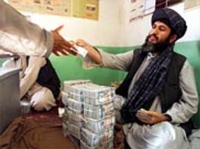Three Afghan success stories
Today, finally a break from the doom and gloom on Afghanistan! Clare Lockhart, the CEO of the Institute for State Effectiveness, spoke at DRI’s annual conference last month and gave three examples of what has gone right in the international effort to rebuild Afghanistan. These reforms and projects have lasted despite worsening security conditions and will—Lockhart says—form part of the foundation for the next generation of reforms in Kabul.
 1) Hawala dealers implement Afghan currency exchange. In 2001, there were three currencies in circulation in Afghanistan, all produced illegally by warlords, with frequently fluctuating values that only the hawala dealers—the country’s informal currency exchangers—could decipher. To move to one unified currency, international donors recommended that Afghanistan switch to the dollar for two years in an expensive and lengthy process that would require the assistance of 15,000 UN bureaucrats. Instead, the Afghans decided to tap into the extensive networks of the local hawala dealers. Once enlisted, they were able to reach every village and change the currency in just 4 months. Clare commented:
1) Hawala dealers implement Afghan currency exchange. In 2001, there were three currencies in circulation in Afghanistan, all produced illegally by warlords, with frequently fluctuating values that only the hawala dealers—the country’s informal currency exchangers—could decipher. To move to one unified currency, international donors recommended that Afghanistan switch to the dollar for two years in an expensive and lengthy process that would require the assistance of 15,000 UN bureaucrats. Instead, the Afghans decided to tap into the extensive networks of the local hawala dealers. Once enlisted, they were able to reach every village and change the currency in just 4 months. Clare commented:
To me that’s a lesson of instead of us looking at what’s not there and what do we need to bring in from the outside, how do we turn it around and learn how to …look at what is there. What are the assets that exist on the ground, what are the networks, what are the traditional and existing ways that people manage their daily lives? And how can those be harnessed to the urgent and important tasks of the day?
 2) Aid underwrites risk so Afghan telecom can take off. Telecoms were reluctant to enter the risky, post-US invasion Afghan market. Donors had suggested that the Afghan government would actually have to pay the telecoms to provide service. Instead, the government and the international community came up with an innovative way to cover the risk and spur investment. OPIC- a US agency that promotes development in emerging markets- stepped in to write a risk guarantee for $20 million for the firms willing to compete for government licenses. The $20 million was never used, and after $1 billion investment in the sector, there are now more than 11 million phones in Afghanistan.
2) Aid underwrites risk so Afghan telecom can take off. Telecoms were reluctant to enter the risky, post-US invasion Afghan market. Donors had suggested that the Afghan government would actually have to pay the telecoms to provide service. Instead, the government and the international community came up with an innovative way to cover the risk and spur investment. OPIC- a US agency that promotes development in emerging markets- stepped in to write a risk guarantee for $20 million for the firms willing to compete for government licenses. The $20 million was never used, and after $1 billion investment in the sector, there are now more than 11 million phones in Afghanistan.
 3) Village-level grant program taps village know-how. Afghanistan’s National Solidarity Program has provided grants to thousands of Afghan villages. The village councils choose how to spend the money, but must post their accounts publicly. Funds for the program are pooled into a locked trust fund that can only be replenished by donors once they’ve seen project audit reports. The program is growing as villages combine grants to take on larger projects, like an irrigation system or a regional maternal hospital, and although the NSP has developed some opposition from politicians who would prefer to be able to skim money off the top of these grants, it has also attracted wide support.
3) Village-level grant program taps village know-how. Afghanistan’s National Solidarity Program has provided grants to thousands of Afghan villages. The village councils choose how to spend the money, but must post their accounts publicly. Funds for the program are pooled into a locked trust fund that can only be replenished by donors once they’ve seen project audit reports. The program is growing as villages combine grants to take on larger projects, like an irrigation system or a regional maternal hospital, and although the NSP has developed some opposition from politicians who would prefer to be able to skim money off the top of these grants, it has also attracted wide support.
To hear Clare Lockhart tell these stories, listen to this 8-minute clip. If you have the time, it’s also well worth listening to her full presentation with slide show on the DRI website, here. [audio:http://aidwatchers.com/wp/wp-content/uploads/2010/03/Lockhart-Afghan-Success.mp3|titles=Lockhart-Afghan-Success]
We wouldn’t be Aid Watch if we didn’t note that Lockhart is also an outspoken critic of failures in the aid system. Her talk contains many tragic examples of aid failures in Afghanistan, which we’ll post another day on the blog.
 From Aid to Equality
From Aid to Equality

